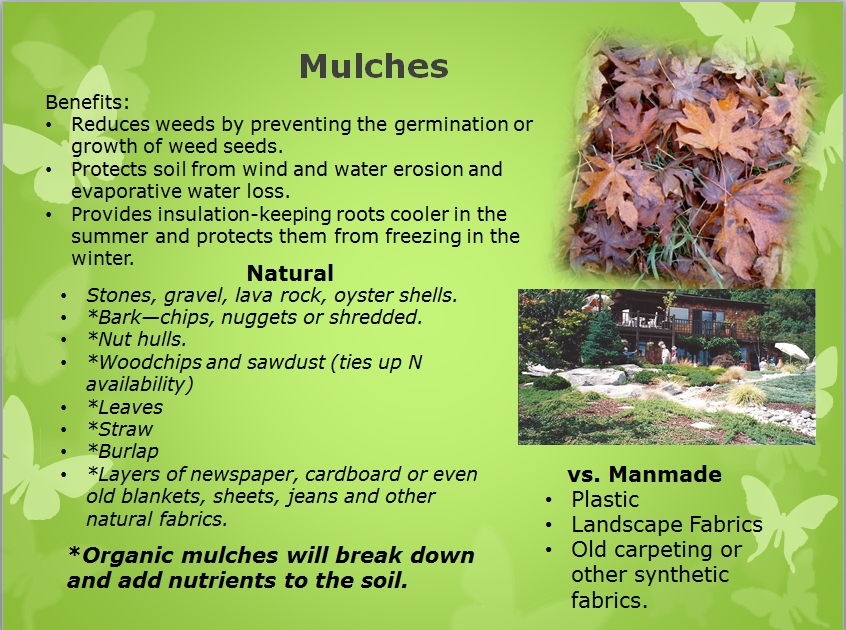Messy or Manicured, Mulch is Marvelous
 Mulch is anything that covers the ground around your plants. The benefits of using mulch are numerous. Most importantly, it can mean less work for you in the future!
Mulch is anything that covers the ground around your plants. The benefits of using mulch are numerous. Most importantly, it can mean less work for you in the future!
Mulch helps to reduce weeds by preventing the germination or growth of weed seeds. (Some seeds that blow onto the top of the mulch, such as Hairy Bittercress, however, are perfectly happy growing in pure bark.)
Mulch protects soil from wind and water erosion and evaporative water loss. It provides insulation keeping roots cooler in the summer and protects them from freezing in the winter.
Mulch comes in two basic types: natural, organic mulches or man-made mulches such as landscape fabrics, plastics, carpeting, etc.
Landscape fabrics come in two types: a papery, fibrous sheet or a fine plastic mesh. Both are designed to allow water to penetrate and are long-lasting. Any that I’ve used or encountered in the landscape, I ultimately end up cursing! Some weeds, such as grasses, still grow up through them and are even harder to remove. Shrubs, such as heaths that grow in width by rooting of lower branches cannot properly expand. Replanting or removing plants is more difficult. Longevity is their drawback—they are not a good choice for an evolving landscape.
Plastic is used for temporary purposes. Black plastic does not allow water to penetrate, but can be used to warm the soil for early planting and helps to prevent weeds, but it should be remembered that some weed seeds can live in the soil for several years. I had an area covered for two years and still had a bumper crop of weeds after the soil was tilled. After using plastic, you still have the problem of disposing of it.
If you have carpeting that would go to the dump otherwise, use it to help control weeds in your vegetable garden—just lay it out and cut holes for the plants.
Stones, gravel, lava rock are not really organic, but are natural. Many people like the look of a dry riverbed, but weeds can still sprout in crevices where soil has collected. Stones are a heat sink and can be used around plants that benefit from the warmth given off during the night after a sunny day.
Organic mulches are all derived from living organisms. As they break down, they improve the soil by providing nutrients and organic matter.
Bark—chips, nuggets or shredded is the favorite here in the northwest. It is attractive and relatively inexpensive. Woodchips and sawdust can also be used but may tie up nitrogen, making less available to plants.
Leaves: I always try to encourage neatniks to leave fallen leaves in their shrub beds, at least over winter. The layer of leaves suppresses weeds, protects the soil, and adds humus to the soil if allowed to remain.
Straw is relatively inexpensive and is often used as a temporary mulch but can sometimes contain seeds—you sometimes end up growing wheat!
Layers of newspaper, cardboard or even old blankets, jeans and other fabrics (preferably natural) can be spread out under other mulches to add an extra barrier for weed suppression.
Burlap or specially designed mats are good for preventing erosion on steep hillsides.
Be creative! If you have access to any other types of organic matter such as nut hulls or other waste products—try them! Just be aware that very green material such as grass clippings or seaweed should be incorporated into the soil or mixed with woodier material or else they get slimy and stinky.
(This article was first published in the Peninsula Gateway on September 30, 2009)

